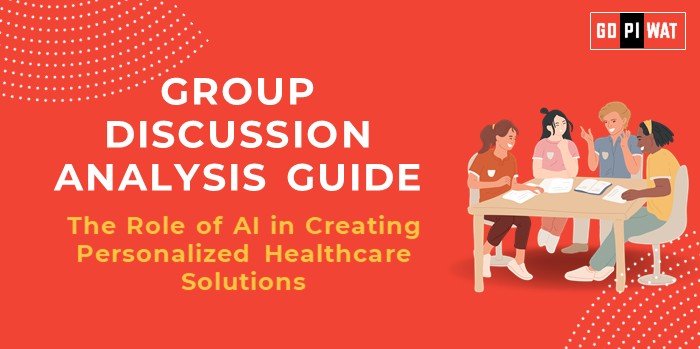📋 Group Discussion (GD) Analysis Guide
🩺 Topic: The Role of AI in Creating Personalized Healthcare Solutions
🌐 Introduction
Artificial Intelligence (AI) is revolutionizing healthcare by offering highly personalized solutions through advanced diagnostics, drug discovery, and patient management systems.
The global AI healthcare market, valued at $19.27 billion in 2023, highlights its growing impact and potential for transforming traditional healthcare approaches.
📊 Quick Facts and Key Statistics
- Global AI Healthcare Market Size: $19.27 billion in 2023, projected to grow at a CAGR of 38.5% (2024–2030).
- AI-Driven Drug Discovery: Reduces time for identifying viable compounds by nearly 70%.
- AI in Diagnostics: Enhances accuracy and efficiency across imaging, patient monitoring, and decision support systems.
- Health Data Utilization: AI tools analyze patient records, medical images, and research papers to deliver actionable insights.
👥 Stakeholders and Their Roles
- Governments: Establish regulatory standards and incentivize AI integration in healthcare.
- Tech Companies: Develop AI-driven healthcare platforms and predictive tools.
- Healthcare Providers: Implement AI solutions for clinical decision-making, diagnostics, and resource optimization.
- Patients: Contribute health data and adopt AI-based tools for personalized care.
- Academia and R&D Centers: Advance AI technologies through research and clinical trials.
🏆 Achievements and Challenges
🎯 Achievements
- Drug Discovery: AI accelerates drug development, cutting time by 70% and reducing costs.
- Enhanced Diagnostics: AI diagnostic tools streamline processes in radiology, oncology, and cardiology.
- Data-Driven Insights: AI algorithms analyze large datasets, aiding in precision medicine.
- Operational Efficiency: AI-driven scheduling and resource allocation improve hospital workflows.
⚠️ Challenges
- Data Privacy Concerns: Extensive use of patient data raises security and ethical issues.
- Infrastructure Gaps: Limited adoption in underdeveloped regions due to lack of technical resources.
- Algorithm Bias: Biased datasets can lead to inaccurate healthcare outcomes.
Global Comparisons: Estonia leads in AI-powered healthcare digitalization, while the U.S. dominates in AI-driven drug discovery.
Case Study: IBM Watson demonstrated exceptional accuracy in oncology diagnostics, surpassing human practitioners in key benchmarks.
🗣️ Effective Discussion Approaches
✨ Opening Approaches
- Statistical Insight: “The global AI healthcare market, valued at $19.27 billion in 2023, is projected to grow at a CAGR of 38.5%, showcasing its transformative potential.”
- Case Study Introduction: “AI-driven diagnostics at Apollo Hospitals reduced cardiac care mortality by 25%, highlighting its practical benefits.”
- Ethical Angle: “The rapid deployment of AI raises critical concerns about privacy and equitable access.”
🎯 Counter-Argument Handling
- Cite proven benefits, such as efficiency in diagnostics and reduced drug discovery timelines.
- Address privacy concerns with anonymization techniques and robust regulations.
- Highlight AI’s scalability in improving access to healthcare services.
📈 Strategic Analysis of Strengths and Weaknesses
- Strengths: Scalability, efficiency, cost savings, enhanced diagnostic precision.
- Weaknesses: High implementation costs, ethical concerns, and regulatory inconsistencies.
- Opportunities: Wider adoption in underserved regions, integration with wearable tech.
- Threats: Cybersecurity risks, societal resistance, and bias in AI algorithms.
📚 Structured Arguments for Discussion
- Supporting Stance: “AI accelerates healthcare delivery by improving diagnostics and reducing costs, transforming global healthcare systems.”
- Opposing Stance: “AI risks exacerbating inequalities due to the digital divide and biased data algorithms.”
- Balanced Perspective: “AI offers immense benefits, but its success depends on equitable deployment and stringent regulations.”
📊 Connecting with B-School Applications
- Real-World Applications: Use cases in financial modeling for AI adoption, healthcare management, and ethical policy-making.
- Sample Interview Questions:
- “What are the key barriers to AI adoption in personalized healthcare?”
- “How can AI in healthcare align with public health objectives?”
- Insights for Students: Learn about AI’s role in healthcare innovation, global benchmarking, and ethical implementation strategies.


